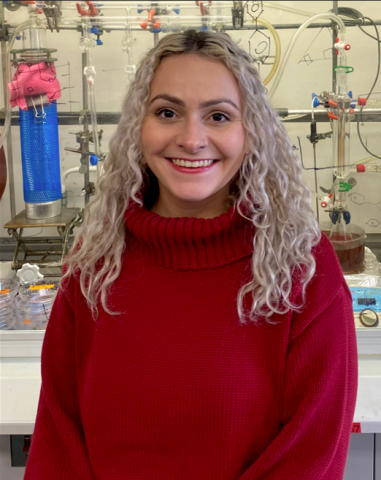1st Year Scholar, PhD candidate Chemistry Johns Hopkins University
Research:
In my research, I design new mixed-valent materials where Fe²⁺ and Fe³⁺ ions are connected by bridging atoms or molecules, and study how electrons move between the ions using techniques like Mössbauer spectroscopy, X-ray diffraction, UV-Vis spectroscopy, and magnetic measurements.
How Will Your Research Benefit Society?
As society becomes increasingly dependent on high-performance computing and data storage, our demand for electricity has and will continue to skyrocket. We consume energy each time we upload a file to “the cloud” or utilize an artificial intelligence tool like ChatGPT to answer a question. The energy demand of data centers is estimated to increase by 1400% between 2016 and 2030. Many proposed solutions to this crisis focus on developing ways to generate more energy in a sustainable way (wind, solar, nuclear) to keep up with computing and data storage needs. However, it is equally important to ask, “How can we change the way computation and data storage are done to make these processes require less energy?” To address this challenge, we must design new materials platforms that can perform these processes in a more energy-efficient way.
Fundamentally, computation and data storage are enabled by the electronic and magnetic properties of the materials that make up computer hardware. In my research, I design materials called metal–organic frameworks that are composed of metal clusters joined together through organic molecules. By tuning the identity of the metals and organic molecules and the geometry in which they assemble, I encode for desirable electronic and magnetic properties in these materials. I then study how electrons move and communicate with one another in these materials using techniques like Mössbauer spectroscopy. It is important to understand how electrons behave in a material and how we can exert control over them to perform useful tasks. As a chemist, my research designing (on a laboratory scale) new electronic and magnetic materials is a vital first step in the development of new energy-efficient computer technology.
How will an ARCS Award Benefit Your Research?
While I have made significant progress on my PhD research using the materials and instruments currently available to me at JHU, funding from the ARCS award will allow me to pursue more specialized but expensive measurements at external facilities. These measurements will provide extremely valuable insights into the electronic and structural properties of my materials.
I will also be able to attend and present my research at multiple prestigious conferences such as the American Chemical Society Fall 2025 National Meeting and the Materials Research Society Fall 2025 Meeting and Exhibit. Attendance at these conferences will allow me to connect with scientists all over the world about our shared research interests and to make valuable networking connections with potential future mentors and colleagues. Finally, I would use the ARCS award funding to attend virtual and in-person workshops on scientific topics that I am curious to learn more about and on practical skills that I am hoping to develop.
Career objectives:
Following my PhD, I hope to obtain a postdoctoral research fellowship at another top research university before pursuing a tenure-track professorship. Throughout my undergraduate and doctoral career, I have benefited from excellent teachers who taught me to approach chemistry through intuition as opposed to memorization, and from impactful mentors who showed me how to pursue research projects with intention, diligence, and creativity. I want to impart these same lessons to my own students. In my future research as a professor, I aim to collaborate with condensed matter physicists to design and synthesize new quantum materials with properties that are desirable for next-generation electronics.

